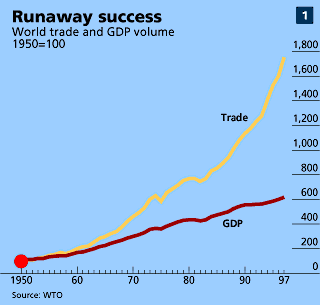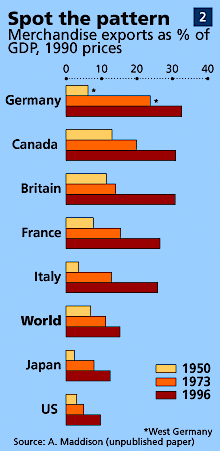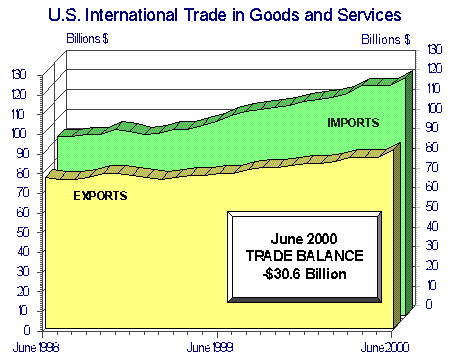
Also see:

OPTIONAL:
In an earlier lesson we studied the economic basis for specialization and exchange - or TRADE. People trade because they gain from trade. Remember: free trade is not forced trade. We don't have to trade with anyone if we don't want to. We learned that specialization and exchange occurs because of the principle of comparative advantage and we used this principle and produciton possibilities curves to show how both sides gain from trade. Everything discussed in that lesson applies to trade between me and Walmart, between Illinois and Alabama, or between the United States and other countries. If you go to a store to buy something rather than produce it yourself, you support trade.
Here we will concentrate on international trade. The reason why we trade with other countries is the same reason why we trade with other states, counties, cities, or with each other - both sides gain.
Questions and Answers on International Trade
Here are some common questions, or maybe I should say misperceptions, concerning international trade.
Questions and Answers on Expanding U.S. Trade Bryan T. Johnson
Policy Analyst
Answering Commonly Asked Questions About Trade Q: Doesn't free trade destroy American jobs?
Q: Doesn't free trade hurt low-wage workers by sending their jobs to other countries while favoring higher-wage workers?
Q: As U.S. exports have grown, so have imports. Doesn't an increase in imports displace Americans who could have manufactured those products here?
Q: Aren't U.S. factories moving overseas just to take advantage of cheaper labor?
Q: Aren't American jobs lost when American businesses move overseas?
Q: Don't import quotas, tariffs, and other barriers to trade protect domestic jobs?
Q: Don't foreign companies operating in the United States siphon off the wealth of Americans by sending their profits back home?
Q: Doesn't buying imports send too much American money overseas?
Q: Does the dramatic increase in the U.S. trade deficit over the past several decades mean that Americans are squandering their wealth overseas?
Q: Don't trade deficits with countries like Japan and China harm the U.S. economy and mean these countries are winning the economic war? Shouldn't we increase our barriers to imports from these countries to protect our own economy?
Q: Won't Americans' standard of living be lowered because some foreign countries subsidize their domestic businesses to make their products cheaper to buy?
Q: Isn't free trade destroying America's manufacturing base and creating a service-oriented economy?
Q: Shouldn't less-developed nations protect developing industries with trade barriers to make them more competitive in the international marketplace?
These questions came from the Heritage Foundation website (http://www.heritage.org/library/categories/trade/tp23.html). According to the author of the web page, the answer all these questions is "NO". For a short explanation go here. For a longer explanation go here.
Unique Aspects of International Trade
Even though the fundamentals that support trade apply to both trade between Illinois and Alabama and to trade between the US and other countries, there are a few diffeerences.
1. mobility differences
Distance does tend to make international trade more costly and therefore less likely than internal trade. But modern transportation has reduced these costs significantly.2. currency differences
When we buy something from Alabama we pay for it using US dollars, but when we buy something from Japan, they want to be paid with Japan Yen. There is a cost and risk involved with exchanging currency and this makes international trade more costly than internal trade. In Europe they have decided to use the same currency (the Euro) to avoid these costs. Yet in developed economies with well-functioning foreign exchange markets this is not a major impediment to trade, but it can be in some developing countries.3. politics
This is the main difference between domestic trade and international trade. The US constitution prohibits restrictions on trade between states. Therefore we in Illinois can't tax Wisconsin cheese to help Illinois dairy farmers. But we can tax cheese imported from other countries. This is one reason that we have political disagreements about trade with Mexico, but not about trade with Montana.
The Facts of International Trade
US Trading Partners
From which countries does the US buy the most and to which countries do we sell the most? Who are the most important trading partners of the US? Please try guessing before scrolling down? China? Japan? Germany? . . . . .
-
-
-
----------- NO
-
-
Top Ten Countries with which the U.S. TradesFor the month of July 2000http://www.census.gov/foreign-trade/top/dst/current/balance.html
The values given are for Imports and Exports added together. These Countries represent 68.49% of U.S. Imports, and 66.99% of U.S. Exports in goods.
Year To Date
Total in Total in
Billions Billions
Country Name of U.S. $ of U.S. $
CANADA 28.60 234.14
MEXICO 19.81 138.79
JAPAN 17.66 120.57
CHINA 10.86 61.56
FEDERAL REPUBLIC OF GERMANY 7.24 50.47
UNITED KINGDOM 6.50 48.37
TAIWAN 6.15 36.97
KOREA, REPUBLIC OF 5.80 38.13
FRANCE 3.84 28.12
MALAYSIA 3.22 19.88
|
Top Ten Countries with which the U.S. TradesFor the month of July 2006http://www.census.gov/foreign-trade/top/dst/current/balance.html
The values given are for Imports and Exports added together. These Countries represent 64.29% of U.S. Imports, and 63.46% of U.S. Exports in goods.
Year To Date |
Growth of Trade
International trade as a percent of total output is growing in the US and throughout the world as countries all around the world lower their trade barriers to gain the advantages of of free trade that we have discussed.
|
Also see: |
|
Even though there are significant efficiency advantages to free trade, as we have discussed, many people support trade restrictions (or barriers). Here we will discuss the types of trade barriers, look at their costs and benefits, and analyze why they exist.
Types of Trade Restrictions
Tariffs are taxes imposed on imported products1) revenue tariffs
2) protective tariffs
Why Trade Barriers Exist -- special-interest effect
a. who gains from trade barriers?
b. who loses from trade barriers?
c. why do trade barriers "look good"?
The COSTS of Trade Barriers
http://www.ncpa.org/pd/trade/pd052699e.html
a. costs to societyThe net cost of trade protection in 8 industries
From McConnell and Brue, 2002
Industry
Annual loss to economy from barriers
Net employment loss if barrier is removed
Annual cost PER JOB SAVED
Textile and apparel
$ 10.04 billion
55,000
$ 182,545
Maritime transport
$ 2.79 billion
2,450
$ 1,138,775
Dairy
$ 1.01 billion
2,083
$ 484,878
Motor vehicles
$ 710 million
3,400
$ 208,824
Sugar
$ 661 million
1,694
$ 390,200
Meat
$ 185 million
100
$ 1,850,000
Steel mills
$ 162 million
1,265
$ 128,063
Nonrubber footwear
$ 147 million
1,316
$ 111,702
Source: compiled from United States International Trade Commission data released December 1995. Data are for 1993"The gains which trade barriers create for protected industries come at the expense of much greater losses for the economy as a whole. The result is economic (productive) inefficiency"
(McConnell and Brue 2005, p. 368)b. impact on income distribution
http://www.ncpa.org/studies/s171/s171.html
The Case FOR Protection (Trade Restrictions)
Now that we know that the overall costs of trade restrictions significantly outweigh the benefits, we shouls ask, "Why do we have them?" The special-interest effect discussed above partially answers this questions. Here let's examine the argunents used by those who support trade barriers. For each argument make sure you (1) understand the argument, (2) know whether the argument is economically sound or not, and (3) if it is economically sound, know whether there are additional problems with the argument.
There are six commonly-used arguments for trade restrictions that we will discuss briefly:
a. Military Self-Sufficiency
b. Create or Protect Jobs
c. Diversification
d. Infant Industry
e. Protection from Dumping
f. Cheap Foreign Labor
The textbook discusses these very well. All I can add is the suggestion that for each argument you understand the following:
a. argument: what is their argument for restricting trade?
b. counterargument: what is wrong with the argument?
c.does the argument make economic sense and if so is it applied correctly?
Military Self-Sufficiency Argument
a. argument:
b. argument makes some economic sense, BUT:
c. counterargument:(1) difficult to measure benefits
(2) many industries make this claim
(3) are there better ways, like subsidies?
Increase Domestic Employment?
a. argument:
b. counterargument:(1) job creation from imports also
(2) retaliation
(3) long-run feedbacks(a) must import to export
(b) jobs change, but not increasedc. argument does not make economic sense
Diversification for Stability
a. argument:(1) protect certain industries to diversify economy
(2) less dependence on one or two products
(3) argument makes some economic sense, BUT:b. counterargument:
(1) doesn't apply to advanced economies
(2) high costs: inefficiency
Infant-Industry Argument
a. argument:(1) temporary protection
(2) new industries become established
(3) protection then removed
(4) argument makes some economic sense, BUT:b. counterarguments
(1) which industries?
(2) temporary?
(3) Is it necessary?
(4) better methods-subsidies?c. strategic trade policy
(1) industrialized economies
(2) promotes product development
(3) examples: Japan; South Korea
(4) problems: retaliation
Protection Against "Dumping"
a. argument:(1) define dumping: below COST
(2) driving out competitors = monopolization
(3) argument makes some economic sense, BUT:b. counterargument:
(1) few cases
(2) price discrimination is not dumping
(3) dumping or comparative advantage?
Cheap Foreign Labor
a. argument:
b: counterargument
c. argument does not make economic sense
Summing Up
Arguments that make some sense, but often abused
a. Military Self-Sufficiency
b. Diversification
c. Infant Industry
d. Protection from Dumping
Arguments that do not make sense, but are very popular
a. increase domestic employment
b. cheap foreign labor
Historical evidence
http://www.ncpa.org/pd/trade/pdtrade/pdtrade10.html
International Trade Policy
Generalized Trade Liberalization
a. NAFTA, + Chile?
b. G.A.T.T.
c. European Union
d. others
Aggressive Export Promotion
Bilateral Negotiations
Trade Deficits
Recent U.S. Trade Deficits

For details see: http://www.census.gov/indicator/www/ustrade.html
Causes of a Trade Deficit
a. large federal budget deficits = high interest ratesb. tighter monetary policy = high interest rates
c. rapid economic growth in the U.S.
Effects of a Trade Deficit
a. increased current domestic consumption
b. increased American indebtedness
Reducing the Trade Deficit: WHY?
a. reduction of the budget deficit
1). economic growth abroad2). other "remedies"
a) easy money policy
b) protective tariffs
c) recession
d) increased American competitiveness
d. WHY worry about it?